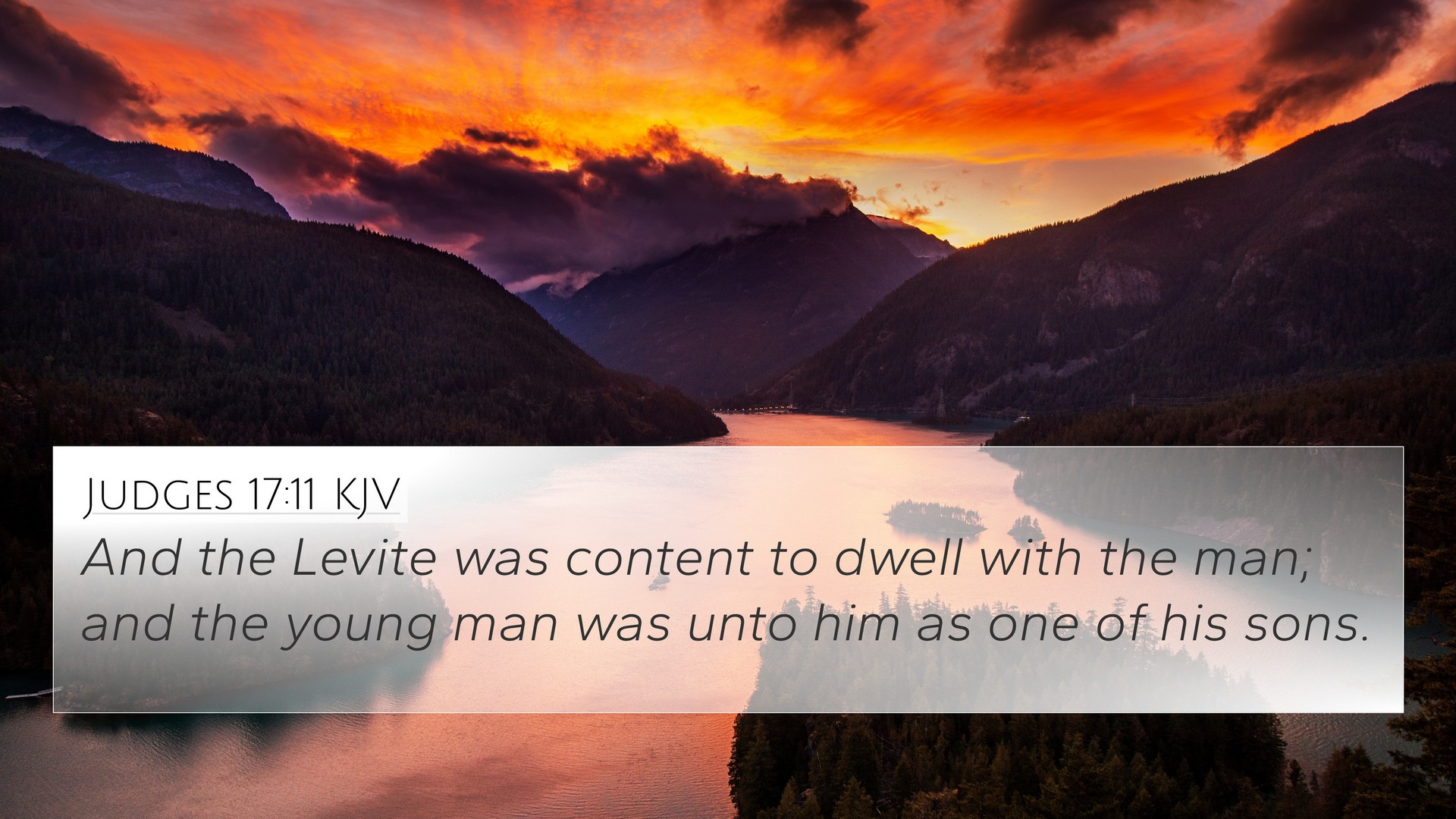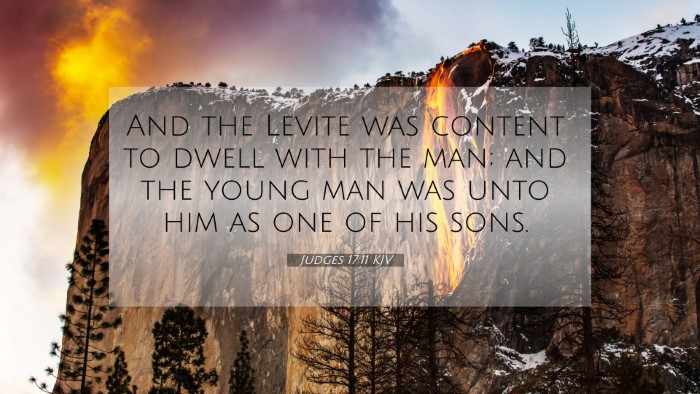Old Testament
Genesis Exodus Leviticus Numbers Deuteronomy Joshua Judges Ruth 1 Samuel 2 Samuel 1 Kings 2 Kings 1 Chronicles 2 Chronicles Ezra Nehemiah Esther Job Psalms Proverbs Ecclesiastes Song of Solomon Isaiah Jeremiah Lamentations Ezekiel Daniel Hosea Joel Amos Obadiah Jonah Micah Nahum Habakkuk Zephaniah Haggai Zechariah MalachiJudges 17:11 Similar Verses
Judges 17:11 Cross References
And the Levite was content to dwell with the man; and the young man was unto him as one of his sons.
Uncover the Rich Themes and Topics of This Bible Verse
Listed below are the Bible themes associated with Judges 17:11. We invite you to explore each theme to gain deeper insights into the Scriptures.
Judges 17:11 Cross Reference Verses
No cross reference images were found in our system for this Bible passage.
Judges 17:11 Verse Analysis and Similar Verses
Understanding Judges 17:11
Bible Verse: Judges 17:11 - "And the Levite was content to dwell with the man; and the young man was unto him as one of his sons." This verse illustrates the relationship between Micah and the Levite, emphasizing themes of personal loyalty and the implications of priestly duties.
Summary of Key Insights
This verse occurs in the context of Micah's idolatry and the Levite’s willingness to serve in a morally ambiguous situation. The following insights are compiled from various public domain commentaries:
- Matthew Henry: Matthew Henry emphasizes the Levite's choice to align with Micah, noting that the Levite sought personal advantage at the expense of divine instruction. This reflects the human tendency to seek comfort over righteousness.
- Albert Barnes: Barnes focuses on the implications of Levites being scattered among the people and highlights how this Levite's acceptance of Micah's household signifies a blending of worship practices that deviates from God's established order.
- Adam Clarke: Clarke's commentary provides context regarding the Levite's lack of a true spiritual mission. His willingness to serve Micah shows how religious roles can be misapplied outside God’s ordained institutions.
Thematic Connections
Judges 17:11 invites readers to consider larger biblical themes, including:
- Identifying Misplaced Allegiance: The willingness of the Levite to serve under less-than-ideal circumstances echoes issues of faithfulness found elsewhere in scripture.
- Consequences of Religious Dilution: This verse exemplifies the risks present when individuals prioritize personal relationships above adherence to divine commands and religious obligations.
Cross-References
To further understand Judges 17:11, consider the following relevant Bible verses:
- Exodus 32:24: Reflects on Aaron's failure when tempted by the people, showing parallels in leadership failure.
- Leviticus 10:1-2: Addresses the seriousness of approaching God with unauthorized worship.
- 1 Samuel 2:12-17: Details the corrupt practices of Eli’s sons as a warning against priestly misconduct.
- Jeremiah 23:11: Speaks of the unfaithful prophets and priests, tying into the theme of corruption in religious service.
- Hosea 4:6: Discusses the consequences of a lack of knowledge among God’s people in relation to their leaders.
- Matthew 7:15-20: Jesus warns about false prophets which parallels the false worship established by Micah.
- Hebrews 7:11-14: Discusses the change of priesthood, indicating the evolution of God’s plan beyond Levites.
Connections between Bible Verses
Judges 17:11 serves as a critical intersection point between various biblical themes, such as:
- Types of Worship: Analyzing the Levite's actions invites us to compare acceptable vs. unacceptable forms of worship found throughout scripture.
- Religious Duty vs. Personal Gain: This complex interplay is reflected in both Old and New Testament teachings.
- Authority in Worship: This verse provides a backdrop for understanding the evolution of priestly authority in the New Testament compared to Old Testament practices.
Conclusion
Judges 17:11 serves as a pivotal text for examining the dynamics of personal relationships in the context of religious duty. As believers study this verse, they are challenged to reflect on their own commitments and the true nature of their worship.


